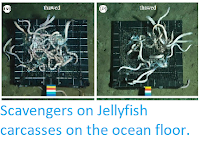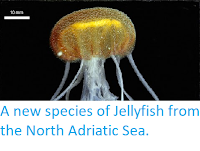Cable Beach in Broome, Western Australia, has been closed the public after two swimmers were stung by Irukandji Jellyfish, Carukia barnesi, this week. Both swimmers are described as female, but neither has been named. The first was stung on Wednesday 25 April 2018, prompting a 24 hour closure of the beach, the second on Sunday 29 April, leading to the beach being closed off again, potentially for a longer period. Both women are being treated in a local hospital, where their condition is described as 'stable'.
An Irukandji Jellyfish, Carukia barnesi. University of California Museum of Paleontology.
The Irukandji Jellyfish is a form of Box Jellyfish, Cubozoa, found along
the northern coast of Australia, which has both a particularly potent
sting and a very small size, making it particularly dangerous to
swimmers. The Jellyfish are typically about 5 mm across, though they can
reach as much as 30 mm, with tentacles between 5 and 50 mm in length.
The sting of these Jellyfish is particularly potent, and can cause
muscle aches, back pain, nausea, headaches, chest and abdominal pains,
sweating, high blood pressure, difficulty breathing, and in extreme
cases death.
The location of Cable Beach, where two women were stung by Irukandji Jellyfish this week. Google Maps.
See also...
Follow Sciency Thoughts on Facebook.








